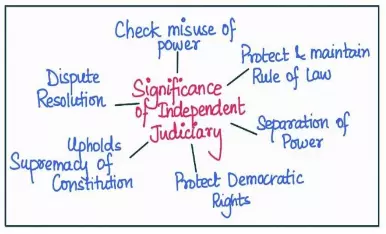![]() 2 Dec 2023
2 Dec 2023
Introduction to Judicial Independence
Judicial Independence means that the judiciary is able to uphold constitutional sovereignty against the invasion of power by legislature and executive. The other organs of the government should not interfere with the decisions of the judiciary and the judges must be able to perform their functions without any fear or favor.
Essentiality of Judicial Independence: Safeguarding Against Misuse of Power

Check Misuse of Power: Judicial Independence that allows the courts to play a central role in ensuring that there is no misuse of power by the legislature and the executive.
Appointment of Judges:
Removal of the Judges:
Tenure of the Judges:
Protection to the Judiciary:
Conclusion
Preserving judicial independence is crucial for an equitable and accessible legal system in India. Overcoming barriers requires ongoing efforts and a commitment to uphold justice for all, irrespective of socio-economic status.
<div class="new-fform">
</div>